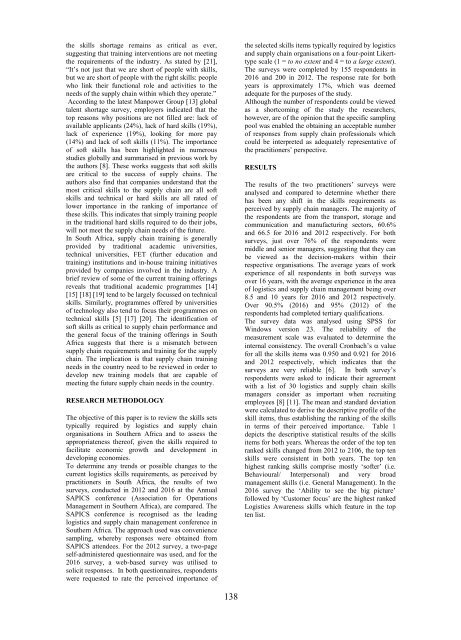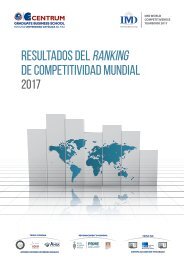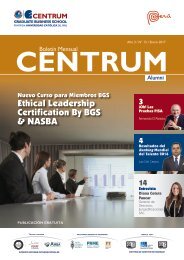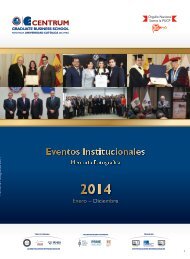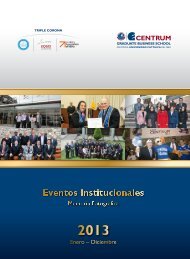Pan-Pacific Conference XXXIV. Designing New Business Models in Developing Economies
This publication represents the Proceedings of the 34th Annual Pan-Pacific Conference being held in Lima, Peru May 29-31, 2017. The Pan-Pacific Conference has served as an important forum for the exchange of ideas and information for promoting understanding and cooperation among the peoples of the world since 1984. Last year, we had a memorable conference in Miri, Malaysia, in cooperation with Curtin University Sarawak, under the theme of “Building a Smart Society through Innovation and Co-creation.” Professor Pauline Ho served as Chair of the Local Organizing Committee, with strong leadership support of Pro Vice-Chancellor Professor Jim Mienczakowski and Dean Jonathan Winterton.
This publication represents the Proceedings of the 34th Annual Pan-Pacific Conference being held in Lima, Peru May 29-31, 2017. The Pan-Pacific Conference has served as an important forum for the exchange of ideas and information for promoting understanding and cooperation among the peoples of the world since 1984. Last year, we had a memorable conference in Miri, Malaysia, in cooperation with Curtin University Sarawak, under the theme of “Building a Smart Society through Innovation and Co-creation.” Professor Pauline Ho served as Chair of the Local Organizing Committee, with strong leadership support of Pro Vice-Chancellor Professor Jim Mienczakowski and Dean Jonathan Winterton.
Create successful ePaper yourself
Turn your PDF publications into a flip-book with our unique Google optimized e-Paper software.
the skills shortage rema<strong>in</strong>s as critical as ever,<br />
suggest<strong>in</strong>g that tra<strong>in</strong><strong>in</strong>g <strong>in</strong>terventions are not meet<strong>in</strong>g<br />
the requirements of the <strong>in</strong>dustry. As stated by [21],<br />
“It’s not just that we are short of people with skills,<br />
but we are short of people with the right skills: people<br />
who l<strong>in</strong>k their functional role and activities to the<br />
needs of the supply cha<strong>in</strong> with<strong>in</strong> which they operate.”<br />
Accord<strong>in</strong>g to the latest Manpower Group [13] global<br />
talent shortage survey, employers <strong>in</strong>dicated that the<br />
top reasons why positions are not filled are: lack of<br />
available applicants (24%), lack of hard skills (19%),<br />
lack of experience (19%), look<strong>in</strong>g for more pay<br />
(14%) and lack of soft skills (11%). The importance<br />
of soft skills has been highlighted <strong>in</strong> numerous<br />
studies globally and summarised <strong>in</strong> previous work by<br />
the authors [8]. These works suggests that soft skills<br />
are critical to the success of supply cha<strong>in</strong>s. The<br />
authors also f<strong>in</strong>d that companies understand that the<br />
most critical skills to the supply cha<strong>in</strong> are all soft<br />
skills and technical or hard skills are all rated of<br />
lower importance <strong>in</strong> the rank<strong>in</strong>g of importance of<br />
these skills. This <strong>in</strong>dicates that simply tra<strong>in</strong><strong>in</strong>g people<br />
<strong>in</strong> the traditional hard skills required to do their jobs,<br />
will not meet the supply cha<strong>in</strong> needs of the future.<br />
In South Africa, supply cha<strong>in</strong> tra<strong>in</strong><strong>in</strong>g is generally<br />
provided by traditional academic universities,<br />
technical universities, FET (further education and<br />
tra<strong>in</strong><strong>in</strong>g) <strong>in</strong>stitutions and <strong>in</strong>-house tra<strong>in</strong><strong>in</strong>g <strong>in</strong>itiatives<br />
provided by companies <strong>in</strong>volved <strong>in</strong> the <strong>in</strong>dustry. A<br />
brief review of some of the current tra<strong>in</strong><strong>in</strong>g offer<strong>in</strong>gs<br />
reveals that traditional academic programmes [14]<br />
[15] [18] [19] tend to be largely focussed on technical<br />
skills. Similarly, programmes offered by universities<br />
of technology also tend to focus their programmes on<br />
technical skills [5] [17] [20]. The identification of<br />
soft skills as critical to supply cha<strong>in</strong> performance and<br />
the general focus of the tra<strong>in</strong><strong>in</strong>g offer<strong>in</strong>gs <strong>in</strong> South<br />
Africa suggests that there is a mismatch between<br />
supply cha<strong>in</strong> requirements and tra<strong>in</strong><strong>in</strong>g for the supply<br />
cha<strong>in</strong>. The implication is that supply cha<strong>in</strong> tra<strong>in</strong><strong>in</strong>g<br />
needs <strong>in</strong> the country need to be reviewed <strong>in</strong> order to<br />
develop new tra<strong>in</strong><strong>in</strong>g models that are capable of<br />
meet<strong>in</strong>g the future supply cha<strong>in</strong> needs <strong>in</strong> the country.<br />
RESEARCH METHODOLOGY<br />
The objective of this paper is to review the skills sets<br />
typically required by logistics and supply cha<strong>in</strong><br />
organisations <strong>in</strong> Southern Africa and to assess the<br />
appropriateness thereof, given the skills required to<br />
facilitate economic growth and development <strong>in</strong><br />
develop<strong>in</strong>g economies.<br />
To determ<strong>in</strong>e any trends or possible changes to the<br />
current logistics skills requirements, as perceived by<br />
practitioners <strong>in</strong> South Africa, the results of two<br />
surveys, conducted <strong>in</strong> 2012 and 2016 at the Annual<br />
SAPICS conference (Association for Operations<br />
Management <strong>in</strong> Southern Africa), are compared. The<br />
SAPICS conference is recognised as the lead<strong>in</strong>g<br />
logistics and supply cha<strong>in</strong> management conference <strong>in</strong><br />
Southern Africa. The approach used was convenience<br />
sampl<strong>in</strong>g, whereby responses were obta<strong>in</strong>ed from<br />
SAPICS attendees. For the 2012 survey, a two-page<br />
self-adm<strong>in</strong>istered questionnaire was used, and for the<br />
2016 survey, a web-based survey was utilised to<br />
solicit responses. In both questionnaires, respondents<br />
were requested to rate the perceived importance of<br />
the selected skills items typically required by logistics<br />
and supply cha<strong>in</strong> organisations on a four-po<strong>in</strong>t Likerttype<br />
scale (1 = to no extent and 4 = to a large extent).<br />
The surveys were completed by 155 respondents <strong>in</strong><br />
2016 and 200 <strong>in</strong> 2012. The response rate for both<br />
years is approximately 17%, which was deemed<br />
adequate for the purposes of the study.<br />
Although the number of respondents could be viewed<br />
as a shortcom<strong>in</strong>g of the study the researchers,<br />
however, are of the op<strong>in</strong>ion that the specific sampl<strong>in</strong>g<br />
pool was enabled the obta<strong>in</strong><strong>in</strong>g an acceptable number<br />
of responses from supply cha<strong>in</strong> professionals which<br />
could be <strong>in</strong>terpreted as adequately representative of<br />
the practitioners’ perspective.<br />
RESULTS<br />
The results of the two practitioners’ surveys were<br />
analysed and compared to determ<strong>in</strong>e whether there<br />
has been any shift <strong>in</strong> the skills requirements as<br />
perceived by supply cha<strong>in</strong> managers. The majority of<br />
the respondents are from the transport, storage and<br />
communication and manufactur<strong>in</strong>g sectors, 60.6%<br />
and 66.5 for 2016 and 2012 respectively. For both<br />
surveys, just over 76% of the respondents were<br />
middle and senior managers, suggest<strong>in</strong>g that they can<br />
be viewed as the decision-makers with<strong>in</strong> their<br />
respective organisations. The average years of work<br />
experience of all respondents <strong>in</strong> both surveys was<br />
over 16 years, with the average experience <strong>in</strong> the area<br />
of logistics and supply cha<strong>in</strong> management be<strong>in</strong>g over<br />
8.5 and 10 years for 2016 and 2012 respectively.<br />
Over 90.5% (2016) and 95% (2012) of the<br />
respondents had completed tertiary qualifications.<br />
The survey data was analysed us<strong>in</strong>g SPSS for<br />
W<strong>in</strong>dows version 23. The reliability of the<br />
measurement scale was evaluated to determ<strong>in</strong>e the<br />
<strong>in</strong>ternal consistency. The overall Cronbach’s value<br />
for all the skills items was 0.950 and 0.921 for 2016<br />
and 2012 respectively, which <strong>in</strong>dicates that the<br />
surveys are very reliable [6]. In both survey’s<br />
respondents were asked to <strong>in</strong>dicate their agreement<br />
with a list of 30 logistics and supply cha<strong>in</strong> skills<br />
managers consider as important when recruit<strong>in</strong>g<br />
employees [8] [11]. The mean and standard deviation<br />
were calculated to derive the descriptive profile of the<br />
skill items, thus establish<strong>in</strong>g the rank<strong>in</strong>g of the skills<br />
<strong>in</strong> terms of their perceived importance. Table 1<br />
depicts the descriptive statistical results of the skills<br />
items for both years. Whereas the order of the top ten<br />
ranked skills changed from 2012 to 2106, the top ten<br />
skills were consistent <strong>in</strong> both years. The top ten<br />
highest rank<strong>in</strong>g skills comprise mostly ‘softer’ (i.e.<br />
Behavioural/ Interpersonal) and very broad<br />
management skills (i.e. General Management). In the<br />
2016 survey the ‘Ability to see the big picture’<br />
followed by ‘Customer focus’ are the highest ranked<br />
Logistics Awareness skills which feature <strong>in</strong> the top<br />
ten list.<br />
138


